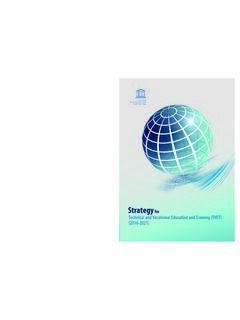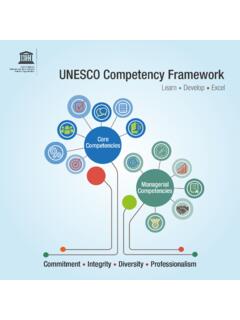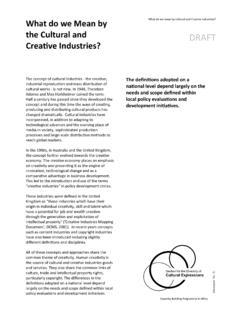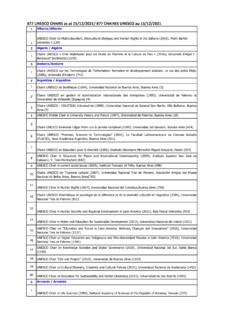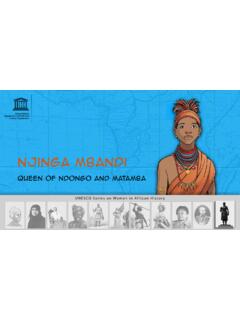Transcription of International Conference on Transforming Technical and ...
1 1 International Conference Transforming Technical and Vocational Education and Training (TVET) for successful and just transitions Concept note Background TVET in a world of work undergoing multiple transitions TVET is at the interface between education and the world of work. As such, TVET systems need to adapt to multiple transitions that are reshaping education systems and labour markets worldwide: an uncertain post-COVID-19 social and economic recovery; technological change leading to a fourth industrial revolution based on digitization, automation and artificial intelligence; the resurgence of informal employment, even in advanced economies; contrasted demographic transitions, whereby some countries experience massive youth bulges whereas others have fast ageing populations; social and political issues exacerbated by poverty and inequality; and, last but not least, the need for a radical transformation of the world economy to achieve sustainable development and bring net greenhouse gas emissions to zero over the next few decades.
2 TVET systems should be proactive in the way they adapt to these transitions, supporting individuals to be lifelong learners who continuously skill themselves to respond to current demands of work and social life, supporting economies in which labour market demand for skills will shift rapidly, and supporting societies that will be increasingly challenged by social, political and environmental changes. Cameron Stephen International Conference on Transforming Technical and Vocational Education and Training (TVET) for successful and just transitions 7 8 December 2021 13:30-15:30 (CET) Online event 2 International Conference Transforming Technical and Vocational Education and Training (TVET) for successful and just transitions Towards a new UNESCO Strategy for TVET (2022 2029) As the United Nations agency specialized in education, UNESCO plays an active part in Technical and vocational education and training (TVET) through normative work, capacity development, policy advice, knowledge development, and Technical assistance.
3 In 2015, UNESCO adopted a Strategy for TVET 2016 2021, which is coming to an end. A new Strategy is being prepared, covering the period 2022 2029, under the theme Transforming TVET for successful transitions . The present meeting is part of a series of consultations regarding the new Strategy, held between September and December 2021 with UNESCO Member States, TVET stakeholders, private sector partners and other International and regional organizations. These consultations aim to ensure that the Strategy captures the key challenges facing TVET, is relevant to the needs of the Member States, and offers synergies with the activities of other development partners. Transforming TVET for successful transitions: Strategic priorities and cross-cutting interventions The new Strategy 2022-2029 will build upon the achievements under the Strategy for TVET 2016 2021 and seek to generate global momentum in support of TVET, contributing to the post-COVID-19 social and economic recovery and to an acceleration of progress towards Sustainable Development Goal 4.
4 It will seek to instil a renewed ambition for TVET in Member States and build a common vision for Transforming labour markets, economies, and societies. Three strategic priorities are proposed: 1. Every person is able to learn, work and thrive, 2. Every economy builds skills for sustainable development, and 3. Every society deploys skills for inclusiveness and resilience. To maximize the outcomes of the new Strategy, UNESCO will conduct cross-cutting interventions, actioning four levers: a. National, regional and global policy learning b. Data collection, research and analysis c. Normative instruments d. Networks and partnerships The rationale for these strategic priorities and cross-cutting interventions, and UNESCO activities to be undertaken under each of them, will be detailed during the meeting. The consultation will also consider how UNESCO can position itself vis- -vis other International or regional organizations that have taken recent initiatives in the field of TVET, and how it can improve its efficiency by strengthening its internal TVET community.
5 Objectives To mobilize key TVET and labour market stakeholders to discuss major challenges facing TVET, new directions and present the key elements of the new UNESCO Strategy for TVET 2022-2029. Audience The participants are representatives from the following stakeholders: TVET stakeholders and partners Local and International organisations active in TVET Government bodies Private sector representatives Youth representatives Teachers representatives 3 International Conference Transforming Technical and Vocational Education and Training (TVET) for successful and just transitions Technical specifications The meeting will be organised online using ZOOM platform and will be live-streamed on YouTube. Language The Conference will be available in English, French and Spanish. Provisional agenda Tuesday, 7 December 2021 (13:30 15:30 CET) High-level segment 13:30 13:32 Projection of a video on UNESCO s mandate and work on TVET 13:32 13:50 Opening session Master of Ceremony: Ms Beatriz R os Yaguez, News Reporter and Broadcast Journalist, Brussels Welcome Speech Greetings, presentation of the participants, statement of general objective of the consultation Mr Borhene Chakroun, Director of the Division for Policies and Lifelong Learning Systems, UNESCO Opening Remarks Advancing SDG4 and SDG8, the contribution of TVET Ms Stefania Giannini, Assistant Director-General for Education, UNESCO Mr Oliver Liang, Head of Unit, Private and Public Services Sectors Unit (SECTOR), International Labour Organization (ILO) Testimony of a learner Ms Yousra Assali, Regional Representative for Middle East and North Africa, WorldSkills Champions Trust, Morocco 13:50 14.
6 20 Ministerial panel Challenges and opportunities for TVET, relevance of the UNESCO Strategy for TVET problem statement, priorities, cross-cutting interventions Moderator: Ms Beatriz R os Yaguez Speaker 1: Ms Ariunzaya Ayush, Minister of Labour and Social Protection, Mongolia Speaker 2: Mr Mahmut zer, Minister of National Education, Turkey 4 International Conference Transforming Technical and Vocational Education and Training (TVET) for successful and just transitions Speaker 3: Mr Younes Sekkouri, Minister of Economic Inclusion, Small Business, Employment and Skills, Morocco Speaker 4: Mr Daniel Crespo, Undersecretary of Education for Specialized and Inclusive Education, Ministry of Education, Ecuador Speaker 5: Ms Margaret Mwakima, Principal Secretary, State Department of Vocational and Technical Training, Ministry of Education, Kenya Speaker 6: Mr Mohamed Megahed, Deputy Minister of Education for Technical Education, Egypt 14:20 - 14:30 Presentation Presentation of the draft UNESCO Strategy for TVET Mr Herv Huot-Marchand, Chief of the Section of Youth, Literacy and Skills Development, UNESCO 14:30 15:00 High-level panel discussions Challenges and new directions for TVET, relevance of the UNESCO Strategy for TVET problem statement, priorities, cross-cutting interventions and synergies with other organizations Moderator: Ms Beatriz R os Yaguez Speaker 1: Mr Chris Humphries, President and Chair of the Board, WorldSKills International Speaker 2: Ms Manuela Geleng, Director for Skills, DG Employment, Social Affairs and Inclusion, European Commission Speaker 3: Ms Alexa Joyce, Digital Transformation & Skills Director, Public Sector Education, EMEA, Microsoft Speaker 4.
7 Mr Andreas Schleicher, Director for the Directorate of Education and Skills, The Organisation for Economic Co-operation and Development (OECD) Speaker 5: Mr Omar Arias, Practice Manager, Global Engagement and Knowledge, Education Global Practice, The World Bank 15:00 15:20 Partnerships to build skills for future jobs Moderator: Ms Beatriz R os Yaguez Speaker 1: Ms M nica Hern ndez, Director of Fundaci n Telef nica Colombia Speaker 2: Mr Guan Mingyu, Global Operation Director, Huawei Talent Alliance Partners Speaker 3: Ms Marie Bancal, Director of Partnerships, Development and Legal at Pix Speaker 4: Ms Luisa F. Echeverria-King, Leader of Academia Internacional at Servicio Nacional de Aprendizaje (SENA) 5 International Conference Transforming Technical and Vocational Education and Training (TVET) for successful and just transitions 15:20 15:30 Closing and the way forward Mr Borhene Chakroun, Director of the Division for Policies and Lifelong Learning Systems, UNESCO Wednesday, 8 December 2021 (13:30 15:30 CET) Technical segment 13:30 13:45 Opening session Master of Ceremony.
8 Mr Herv Huot-Marchand, Chief of the Section of Youth, Literacy and Skills Development, UNESCO Welcome Speech Greetings, presentation of the participants, statement of general objective of the consultation, summary of high-level segment Mr Borhene Chakroun, Director of the Division for Policies and Lifelong Learning Systems, UNESCO Testimony of a teacher Ms Huyen Thi Thuy Pham, Deputy of Science and International Department, Hanoi College for Electro-Mechanics, Viet Nam 13:45 14:30 Panel session I Panel discussions: Skills for individuals to learn, work and live Moderator: Ms Edel Cassar, Director Strategy Implementation at the Malta College of Arts, Science and Technology, Malta, UNEVOC Network Speaker 1: Mr Michael Fung, Deputy Chief Executive (Industry), SkillsFuture, Singapore Speaker 2: Ms Marcia Rowe-Amonde, Senior Director, TVET Development and Support Systems at Human Employment and Resource Training (HEART) Trust NTA, Jamaica Speaker 3: Mr Kipkirui Langat, Director General/CEO, Technical and Vocational Education and Training Authority (TVET Authority), Kenya Speaker 4: Ms Victoria Levin, Senior Economist in the Education Global Practice, co-Lead of the Skills Global Solutions Group, The World Bank Panel session II Panel discussions: Skills for economies to transition towards digitalisation and sustainable development 6 International Conference Transforming Technical and Vocational Education and Training (TVET) for successful and just transitions Moderator: Mr Erik Swars, Head of International Affairs, Swiss Federal University for Vocational Education and Training (SFUVET), UNEVOC Network Speaker 1: Ms Nazrene Mannie, Executive Director, Global Apprenticeship Network (GAN) Speaker 2.
9 Mr Manish Sabharwal, Chair, FICCI Skill Development Committee and Executive Vice-Chairman of Teamlease Services, India Speaker 3: Mr Ahmed El-Ashmawi, Senior International Expert with a special focus on Technical and Vocational Education and Training (TVET), Member of the advisory Committee for the Reform of Technical Education, Ministry of Education and Technical Education, Egypt Speaker 4: Ms Marieke Vandeweyer, Senior Policy Analyst, Vocational Education and Training OECD Centre for Skills 14:30 15:15 Panel session III Panel discussions: Skills for inclusive and resilient societies Moderator: Ms Marlene Abraham-Finlay, Training Support Coordinator, Grenada National Training Agency, UNEVOC Network Speaker 1: Ms Sarah Ojuando-Ndinya, Director of Design and Technology, Educate! Speaker 2: Ms Outi K rkk inen, Senior Human Capital Development Expert - Focal point for Gender, European Training Foundation Speaker 3: Ms C line Trublin, Manager of the Basic needs, Economic Recovery and Economic Inclusion Unit, Humanity & Inclusion, Handicap International Speaker 4: Mr David B.
10 Bungallon, Executive Director, National Institute for Technical Education and Skills Development (NITESD), Technical Education and Skills Development Authority (TESDA), Philippines Panel session IV Panel discussions: Data and monitoring of TVET Moderator: Mr Friedrich Huebler, Acting Head of UNESCO-UNEVOC International Centre for Technical and Vocational Education and Training Speaker 1: Mr Matt Sigelman, CEO, Emsi Burning Glass Speaker 2: Ms Valentina Stoevska, Senior Statistician, ILO Department of Statistics Speaker 3: Mr Konstantinos Pouliakas, Expert on Skills and Labour Markets, European Centre for the Development of Vocational Training (Cedefop) Speaker 4: Mr Hector Niehues-Jeuffroy, Planning officer, Competence Centre Education, Vocational Education, Labour Market, GIZ 7 International Conference Transforming Technical and Vocational Education and Training (TVET) for successful and just transitions 15:15 15:20 Wrap-up of the parallel sessions Mr Herv Huot-Marchand, Chief of the Section of Youth, Literacy and Skills Development, UNESCO 15:20 15:30 Closing and way forward Mr Borhene Chakroun, Director of the Division for Policies and Lifelong Learning Systems, UNESCO
